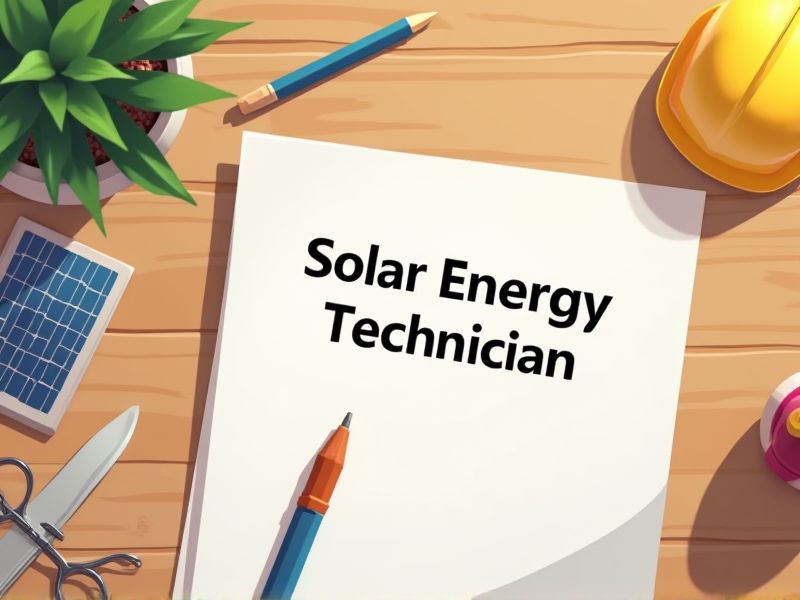
Solar energy technicians require specific certifications to ensure they possess the essential skills for installing and maintaining solar power systems effectively. Certifications verify their proficiency in working with complex electrical systems and adherence to safety standards, which mitigates risks associated with photovoltaic installations. They also assure clients and employers that the technician is up-to-date with the latest technologies and regulations in the rapidly evolving solar industry. Key certifications necessary for a solar energy technician include the following.
NABCEP PV Installation Professional Certification
Obtaining the NABCEP PV Installation Professional Certification enhances a technician's credibility, showing they meet industry-recognized standards, which can lead to increased trust from customers and employers. Research indicates that certified professionals often have more comprehensive knowledge of safety protocols and installation techniques, reducing the likelihood of errors and accidents. The certification can also provide a competitive edge in the job market, potentially resulting in better employment opportunities and higher wages. Professionals with the NABCEP certification may help companies meet state and federal requirements, which can be crucial in securing large contracts and maintaining compliance with energy regulations.
NABCEP PV Associate Certification
NABCEP PV Associate Certification is needed for Solar Energy Technicians because it provides fundamental knowledge of photovoltaic systems, which enhances job readiness. The certification is industry's stamp of trusted competence, making technicians more attractive to employers. With a recognized standard of expertise, technicians with the certification often benefit from greater career advancement opportunities. Employers see this certification as a commitment to professional growth and staying updated with the latest solar technology trends.
OSHA 10-Hour Construction Safety Certification
Being a solar energy technician involves working at heights and handling electrical components, which increases the risk of accidents and injuries. The OSHA 10-Hour Construction Safety Certification provides essential training on recognizing and mitigating workplace hazards, enhancing safety on the job. Employers often require this certification as it demonstrates a technician's commitment to workplace safety standards and helps reduce liability. Furthermore, having this certification can improve job prospects and career advancement opportunities within the construction and renewable energy sectors.
First Aid/CPR/AED Certification
First Aid/CPR/AED Certification is needed for a Solar Energy Technician because working at heights or with electrical systems poses significant risks of injury or accidents. Receiving proper training ensures immediate response to emergencies like electric shocks, minimizing potential harm. Certification enhances the safety culture within the workplace, promoting precautionary measures among the team. Employers often prefer certified technicians, as it reduces liabilities and demonstrates readiness in handling unforeseen situations.
State Electrical Technician License
State Electrical Technician Licenses ensure that solar energy technicians meet standardized safety and competency requirements, reducing the risk of electrical accidents during installation and maintenance. Regulatory compliance ensures that solar projects align with local building codes and electrical standards, which enhances system reliability and efficiency. Licenses serve as a verification of expertise, fostering consumer trust and encouraging the growth of the renewable energy market. Without a state license, technicians may lack access to legal protections and professional credibility, limiting both job opportunities and project scalability.
Solar Photovoltaic (PV) Design Certification
Obtaining a Solar Photovoltaic (PV) Design Certification equips technicians with the knowledge to safely and effectively design solar energy systems, reducing the risk of system failures. A certified technician demonstrates expertise recognized industry-wide, increasing credibility and trust among clients and employers. The certification ensures compliance with local and national regulations, which is critical for legal and safe installations. Market demand for certified technicians often leads to better job opportunities and higher earning potential in the competitive renewable energy sector.
Certified Energy Manager (CEM)
The presence of a Certified Energy Manager (CEM) ensures that solar energy systems are designed and implemented with optimal efficiency. By having a CEM, energy audits and analysis are conducted rigorously, identifying areas for potential energy savings and improvements. A CEM brings a comprehensive understanding of energy policy and regulation, which is crucial for navigating compliance issues in solar projects. Their expertise in energy management helps in reducing operational costs and enhancing the overall performance of solar installations.
Renewable Energy Professional (REP) Certification
The demand for skilled professionals in the solar energy sector drives the need for Renewable Energy Professional (REP) Certification, as it ensures a standardized knowledge base and skill set. This certification enhances credibility and trust among employers, leading to increased job opportunities and career advancement for solar energy technicians. With regulatory requirements and technological advancements in renewable energy, having a REP Certification ensures that technicians remain updated with the latest practices and standards. The certification promotes safety and efficiency in solar installations, which is critical for maintaining long-term system performance and client satisfaction.
NABCEP PV Technical Sales Certification
The NABCEP PV Technical Sales Certification enhances credibility and trust among customers, leading to increased sales opportunities for solar energy technicians. It signifies a high level of competence and knowledge, which attracts employers seeking qualified professionals in the solar industry. Achieving this certification often results in better job prospects and higher salaries due to recognized expertise. As the solar market grows and competition intensifies, certified technicians are more likely to stand out and succeed.
LEED Green Associate Certification
Achieving LEED Green Associate Certification equips a solar energy technician with an understanding of green building principles that align with sustainable energy solutions. This certification enables the technician to contribute effectively to projects that aim for LEED certification, making them more appealing to environmentally-conscious clients. The knowledge gained from LEED certification ensures that solar installations are integrated with broader sustainability goals, enhancing their environmental impact. The qualification also enhances a technician's marketability, as clients and employers increasingly prioritize sustainability expertise.
Summary
As a reader, when considering certifications for a Solar Energy Technician, you can expect increased employability due to recognized skill validation. Certified technicians often command higher salaries, reflecting their specialized training and credibility. These credentials can lead to advanced job roles with greater responsibilities. Businesses hiring certified technicians benefit from enhanced project efficiency and quality assurance.
